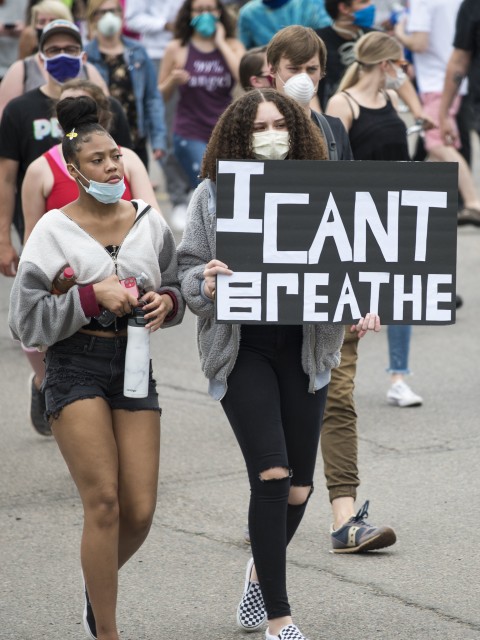The additional violence of George Floyd’s autopsy report
It’s getting harder to believe in the vindication of history.

It’s Friday night, May 29, the year of our Lord 2020, and I am looking at Twitter. I see a news item: George Floyd’s autopsy “revealed no physical findings that support a diagnosis of asphyxia or strangulation,” citing instead “underlying health conditions and any potential intoxicants in his system” as the cause of his death, which inconveniently happened under the knee of a Minneapolis police officer. I see news items dutifully reporting that Floyd died, somehow, after said officer “kneeled on” him. I see a US senator comment that he doesn’t know what kneel on means while murder is right there for said news outlets to use. I see a local news crew in Louisville fired on by police, with rubber bullets shot square into the camera. I see an anonymous Facebook employee fretting that “history will not judge us kindly” for their employer’s acquiescence to the violent rhetoric of the president.
And as I often have in recent weeks, I think of the words of the German Jewish intellectual Walter Benjamin, who died by suicide in 1940: “even the dead will not be safe from the enemy if he wins.” George Floyd is dead, may God rest his soul. But whether he will have died by deliberate violence or “underlying health conditions and any potential intoxicants” is being contested and decided right now. Whether innovations in violence against media outlets and in tech platforms boosting violent rhetoric will become a new standard is being decided right now.
Read our latest issue or browse back issues.
In 2017 it was fashionable to point out the year in our common Gregorian calendar and express disbelief that some depredation was taking place in this apparently quite advanced year. Progress should have spared us this in twenty-effing-seventeen. But that fashion died down as it became clear that trends were not favorable and that the advancing numbers may not mean anything good, if they mean anything at all.
That disbelief has been replaced with a wistful projection into the future, when history will render a judgment on the failures of the present. Progress may be arrested, perhaps for so long that none of us will see its resumption. But history still lurks in the distance, cunning and inexorable. What we fail to stop or correct will surely be snatched up and weighed without mercy by history. Some will be vindicated while others are judged unkindly, even harshly.
How anyone came to rely on numbers on a calendar or the court of the future to decide the very things being contested in front of us is a question too deep for me to answer on a Friday night in May. But on this night when so much appears unsettled and when so many ominous or hopeful doors have suddenly swung open, I am angry about it.
We may tell ourselves that the defining battles of history are safely behind us, with only retrograde holdouts and momentary retreats to overcome. Or we may tell ourselves that our failures today will be made good by an advocate or redeemer who will set things right in a few decades or centuries. Both are infantile coping mechanisms passing themselves off as sophistication.
Benjamin’s point, as far as I can grasp it, is that today’s winners decide the meaning of yesterday’s events, keeping the past in a constant state of flux. On Twitter people are insisting to Martin Luther King Jr.’s son that his father would not have approved of today’s unrest. Dead these 52 years, he is still not safe. History never stops and never arrives. History makes no judgments. History will not save us.
In January, which already feels like another era, members of the US House of Representatives summoned their colleagues in the Senate to their responsibility to posterity. History was being made, then and there, with a decision about the legality of a president using the power of his office to require that another nation act to further his personal political agenda as a condition for receiving funds already approved by Congress. More simply, it was a question of whether the line between the person and the office could be erased for the sake of convenience, and all the awesome power of the latter be put at the mere discretionary use of the former. Is the president above the law?
The answer the Senate gave, without apparent fear of the tribunal of history, was simply yes. In one sense this was predictable, as presidential power had already moved beyond any constitutional limits in warmaking and then in counterterrorism or “national security” more generally. Now it was beyond the reach of any power of Congress, which cannot subpoena the executive branch, nor investigate it, nor restrain it with legislative language or appropriations, nor exercise the power of impeachment provided 34 senators remain on the president’s team.
It was a sudden and final voiding of the only basis for the legitimacy of our Constitution, which had never guaranteed freedom, democracy, or even the rule of law, but only an executive subject to checks and balances. No one really seems to know what to do in a moment like that, least of all the ashen-faced functionaries who heroically mustered the Federalist Papers, the framers, and the solemn duties of a legislative body for one last charge against an impregnable fortress. A constitution’s text may stand still while its operations change utterly. While people scramble to adapt, history is already moving.
We are thrice-cursed to live in a time when these cataclysmic crises of legitimacy seem to happen weekly, with the emerging truth always threatening to overwrite an inconvenient present. Over 100,000 die in a pandemic in three months and the still-cooling bodies are being stashed here and there: “high risk,” “vulnerable,” “underlying health conditions” (which are, I learned tonight, a risk factor when your neck is crushed for nine minutes). Theirs is the disease that cannot, after all, be held to justify the cure of stopping business for more than six weeks, they the victims whose “living,” in the prescient words of my lieutenant governor here in Texas, is superseded by “more important things.”
It is an audacious play for meaning, an attempt to write the rule by which the deaths will be measured. The dead will not be safe. They will have died of something else, or perhaps not at all. The ludicrous conspiracy theories being spread so ably by the employers of anonymous anguished tech workers can, without a doubt, win. And if they do, they will easily bargain those 100,000 down to half of that, or to who-really-knows.
It’s Friday night, and I’m watching buildings burn in multiple cities and police firing rubber bullets at journalists and tear gas at unarmed protesters while a thousand Americans a day die of a preventable disease. To whatever extent I ever assumed that the future would be a better version of the past, I was wrong. To whatever extent I assumed I knew what future or past even meant, I was wrong.
Anna Seghers, another German Jewish writer (who escaped Nazi Germany and, unlike Benjamin, lived to tell about it), begins her novel The Seventh Cross with a beautiful portrait of the Rhine through the ages, traversed by armies and watched by schoolboys from time immemorial. “We have arrived,” the passage concludes. “What happens now is happening to us.” She published those words in 1942, about a concentration camp in a region populated by ordinary people, while no outcome was certain.
Our yearning for history’s verdict can’t banish the suspicion that we live in the last of all the ages, beyond which there will be no appeal. No one will take responsibility for us, no one will testify on our behalf, and nothing but our own actions will give judgment.
A version of this article appears in the print edition under the title “Racism reaches even the dead.”





